Major Henry Charles David Marshall - Wallet 1 - Booklet 2 - Part 1
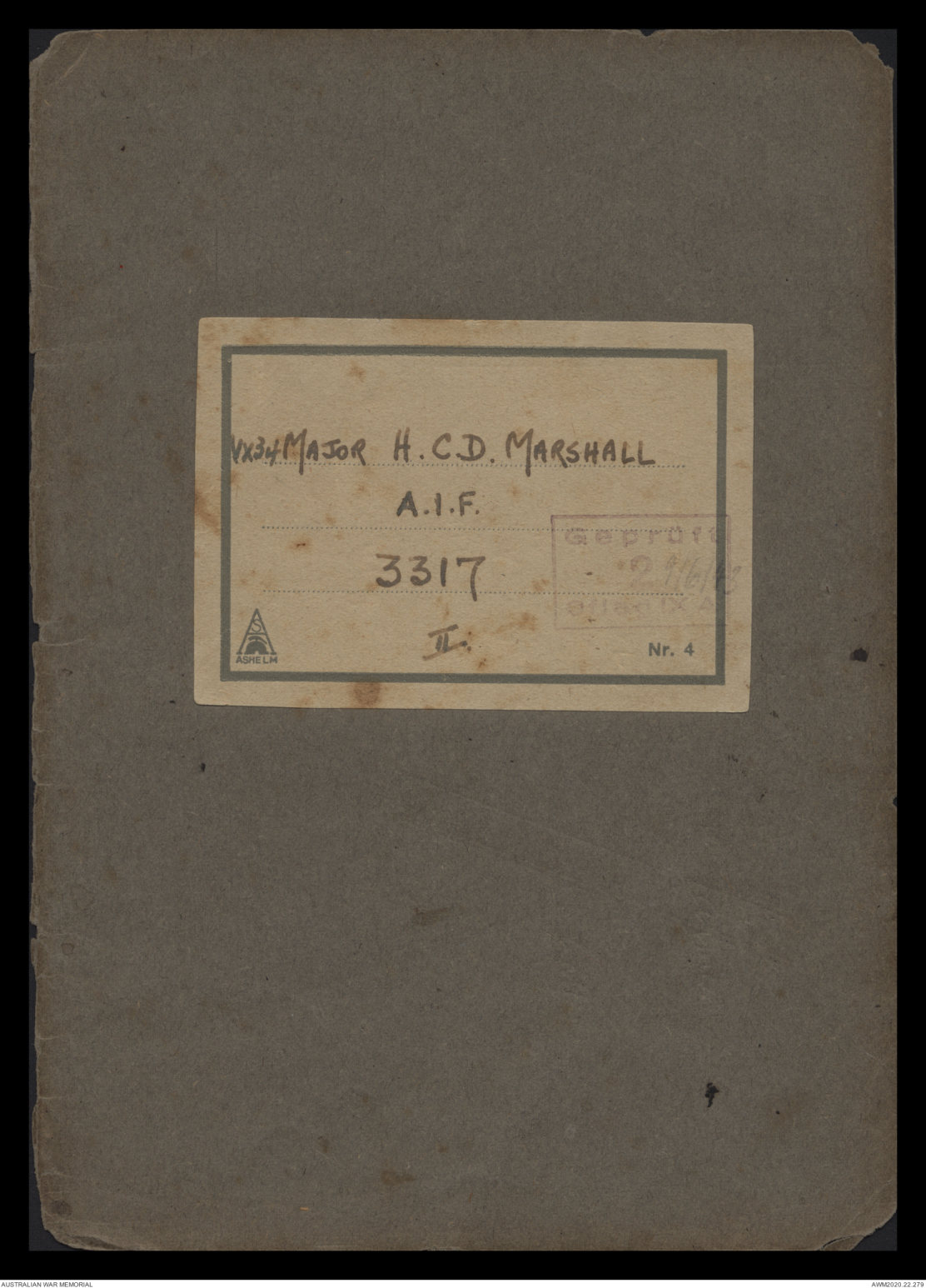
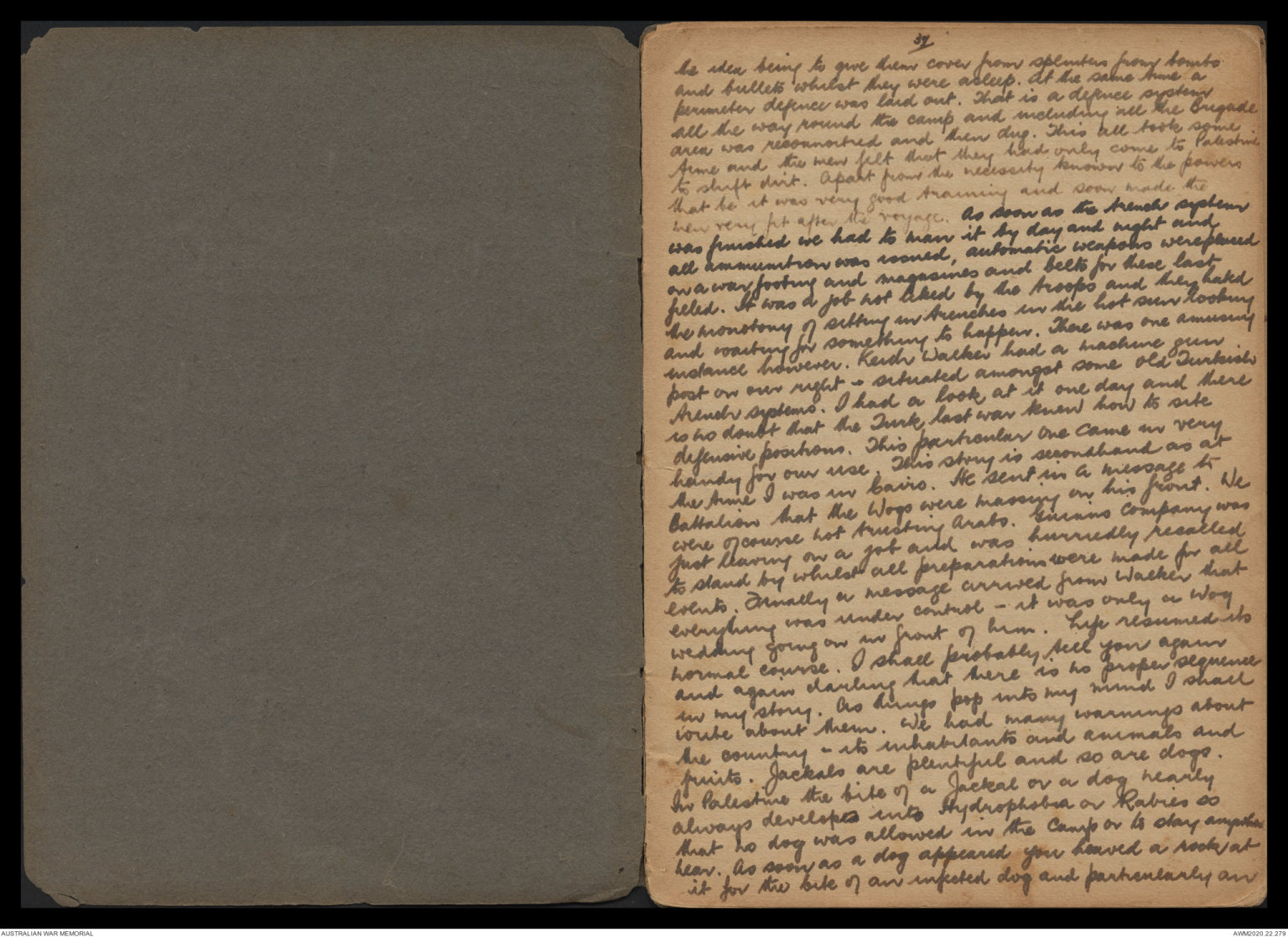
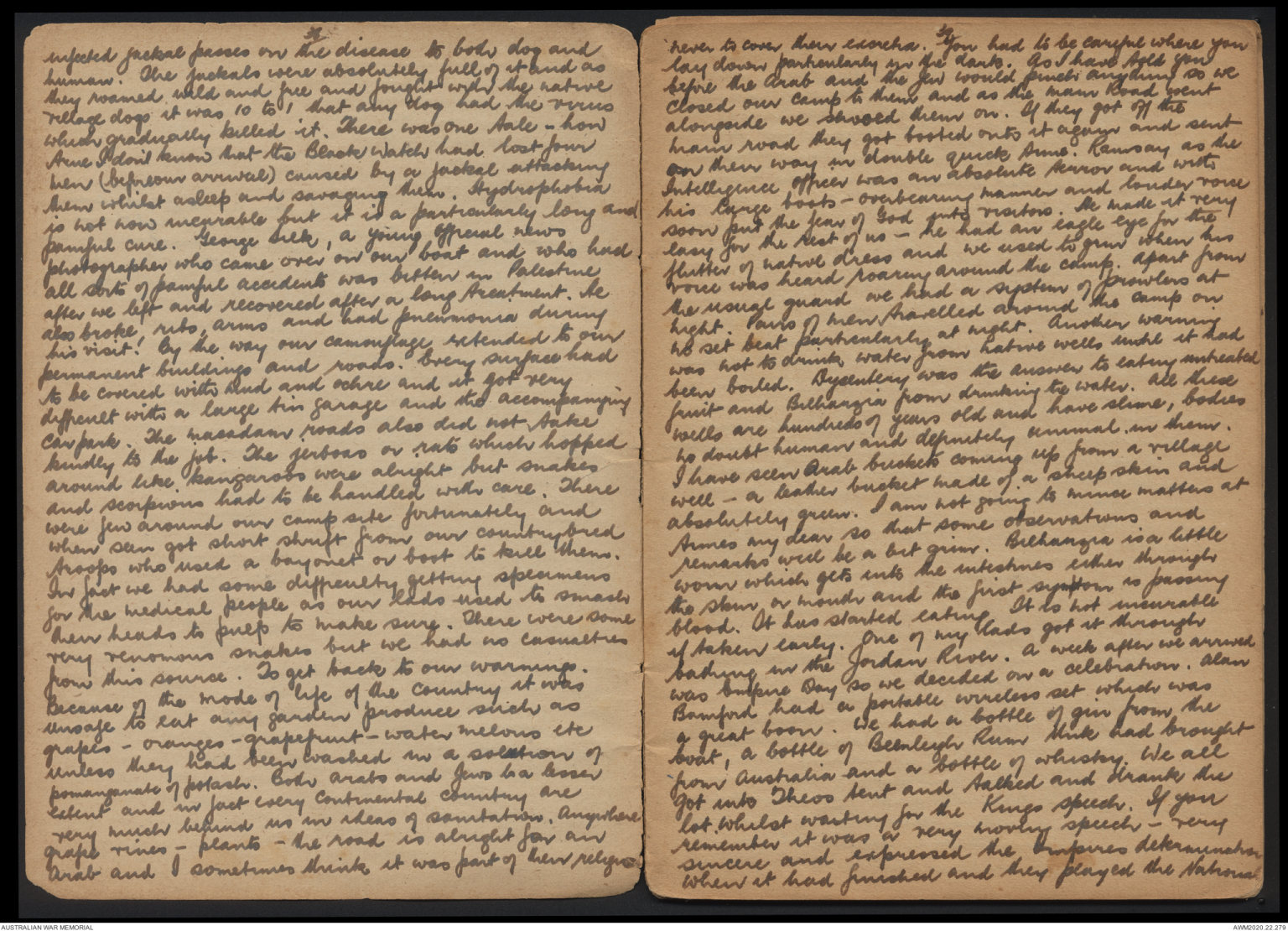
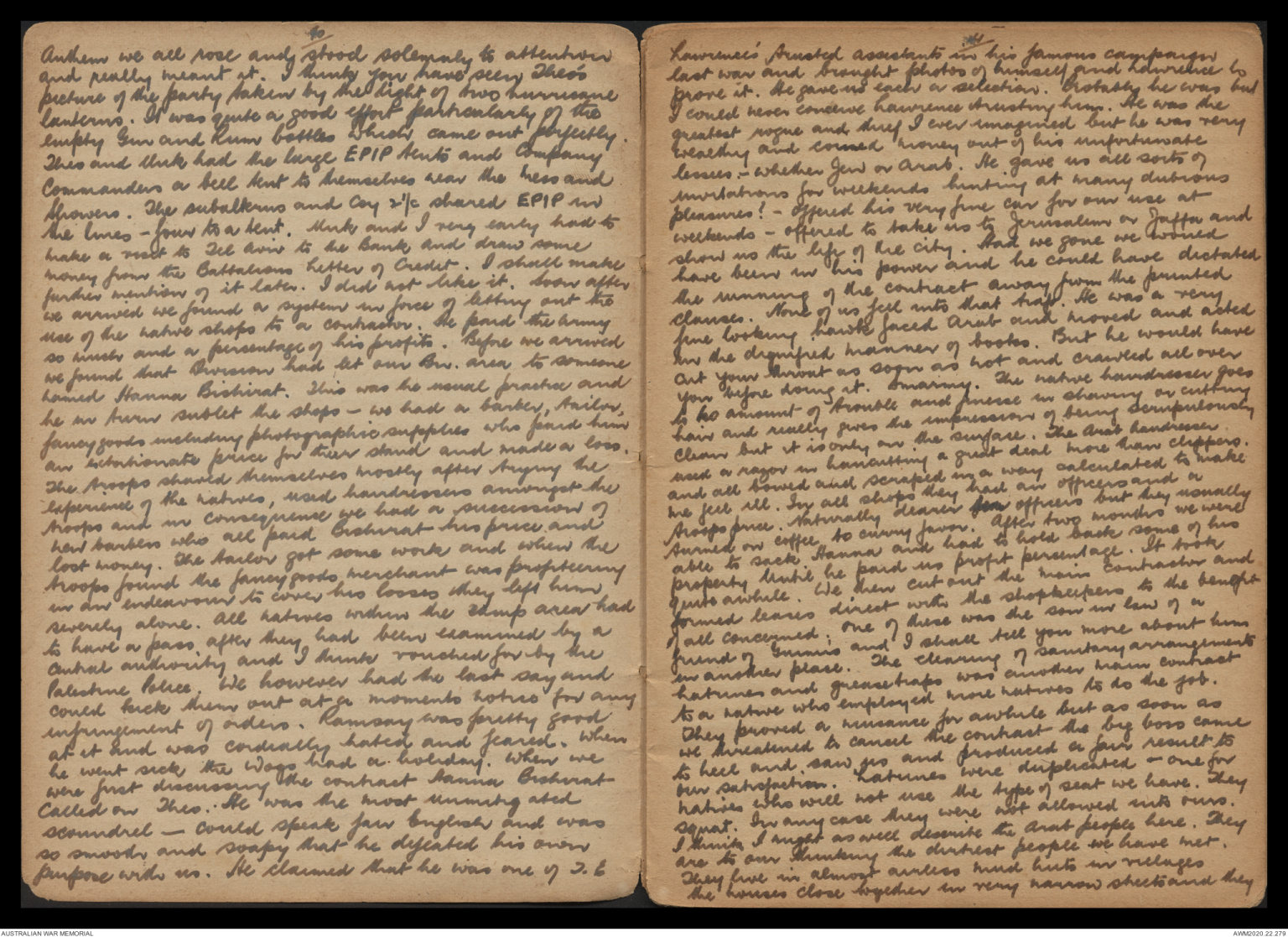
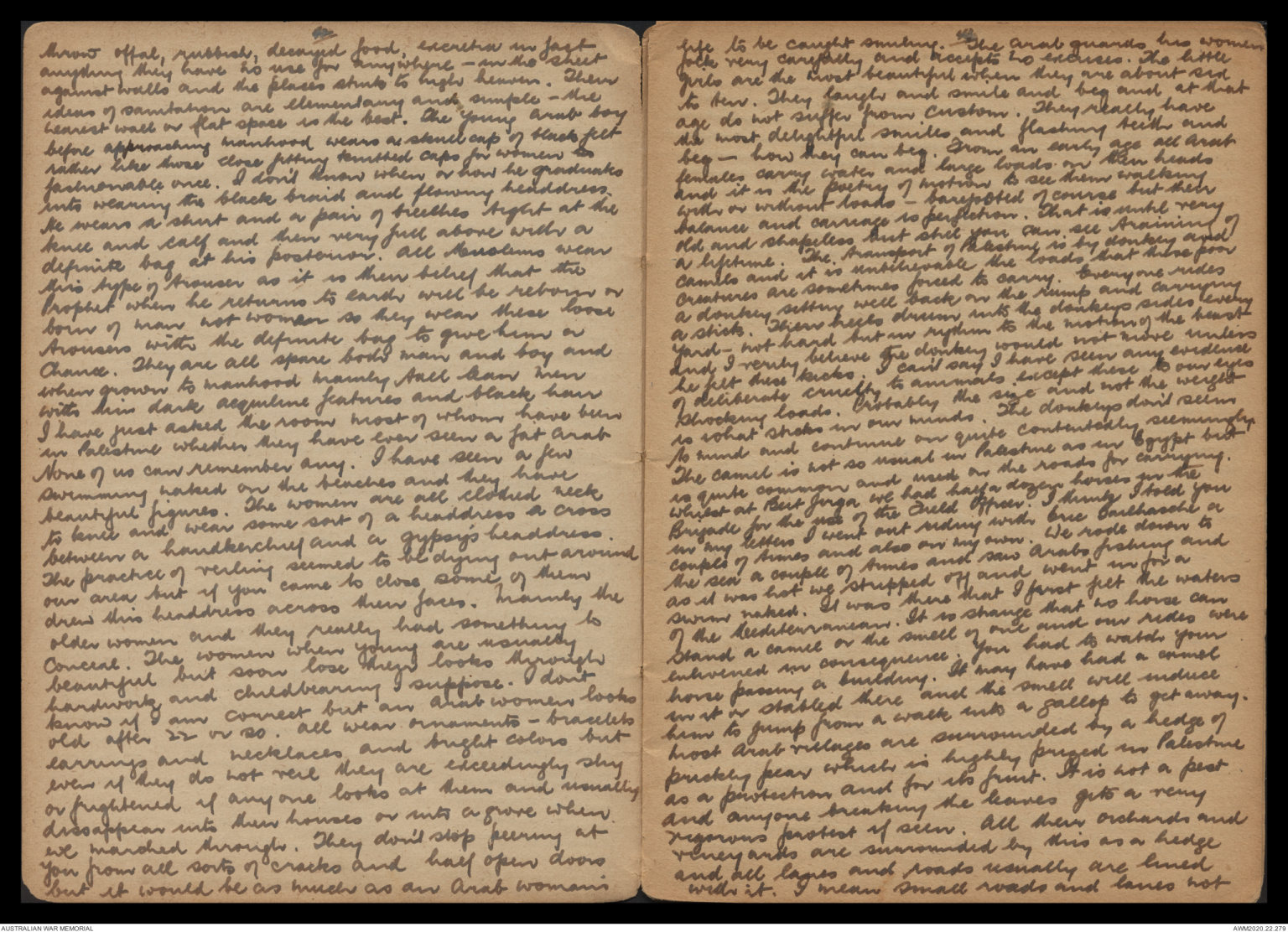
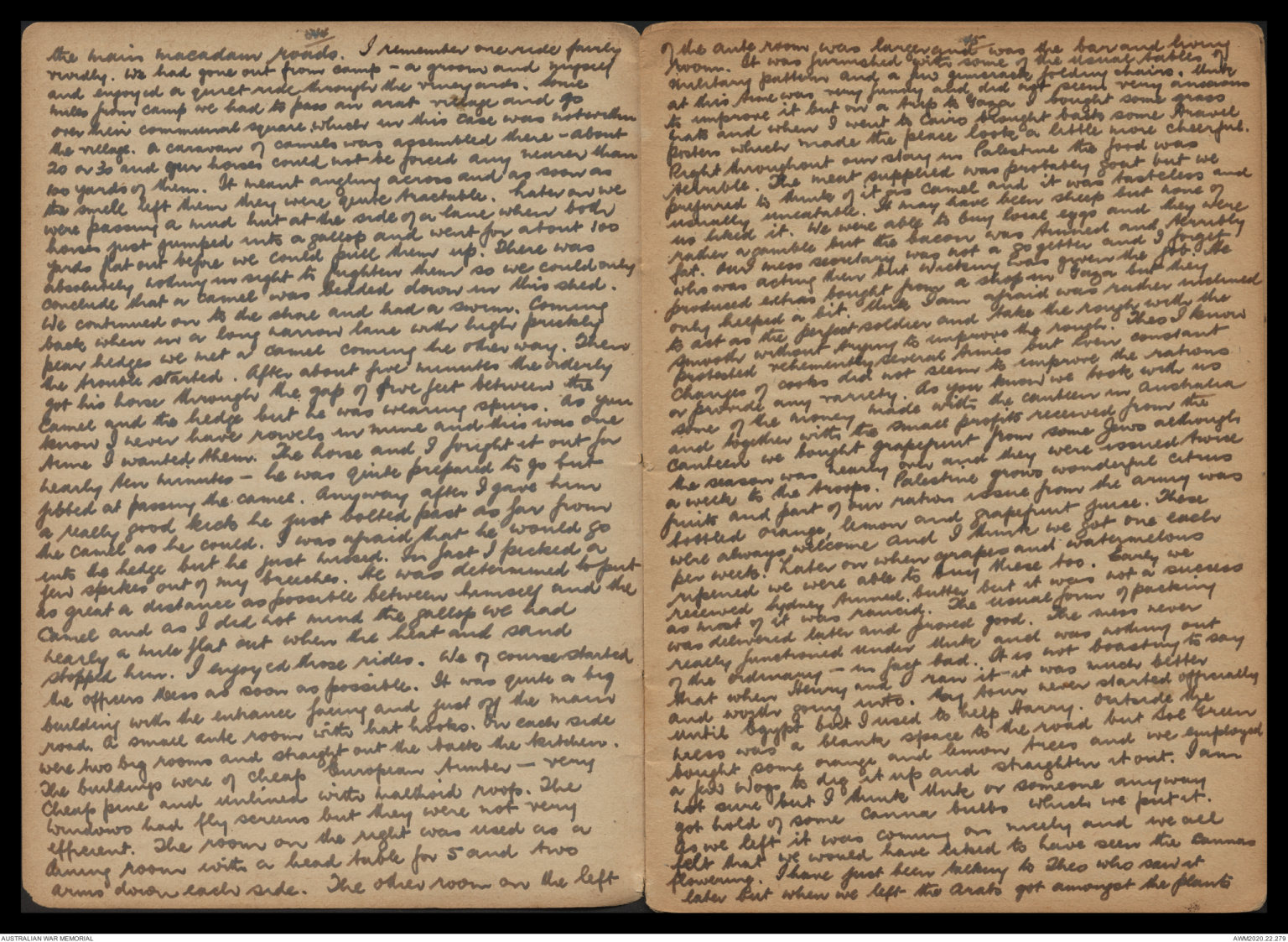
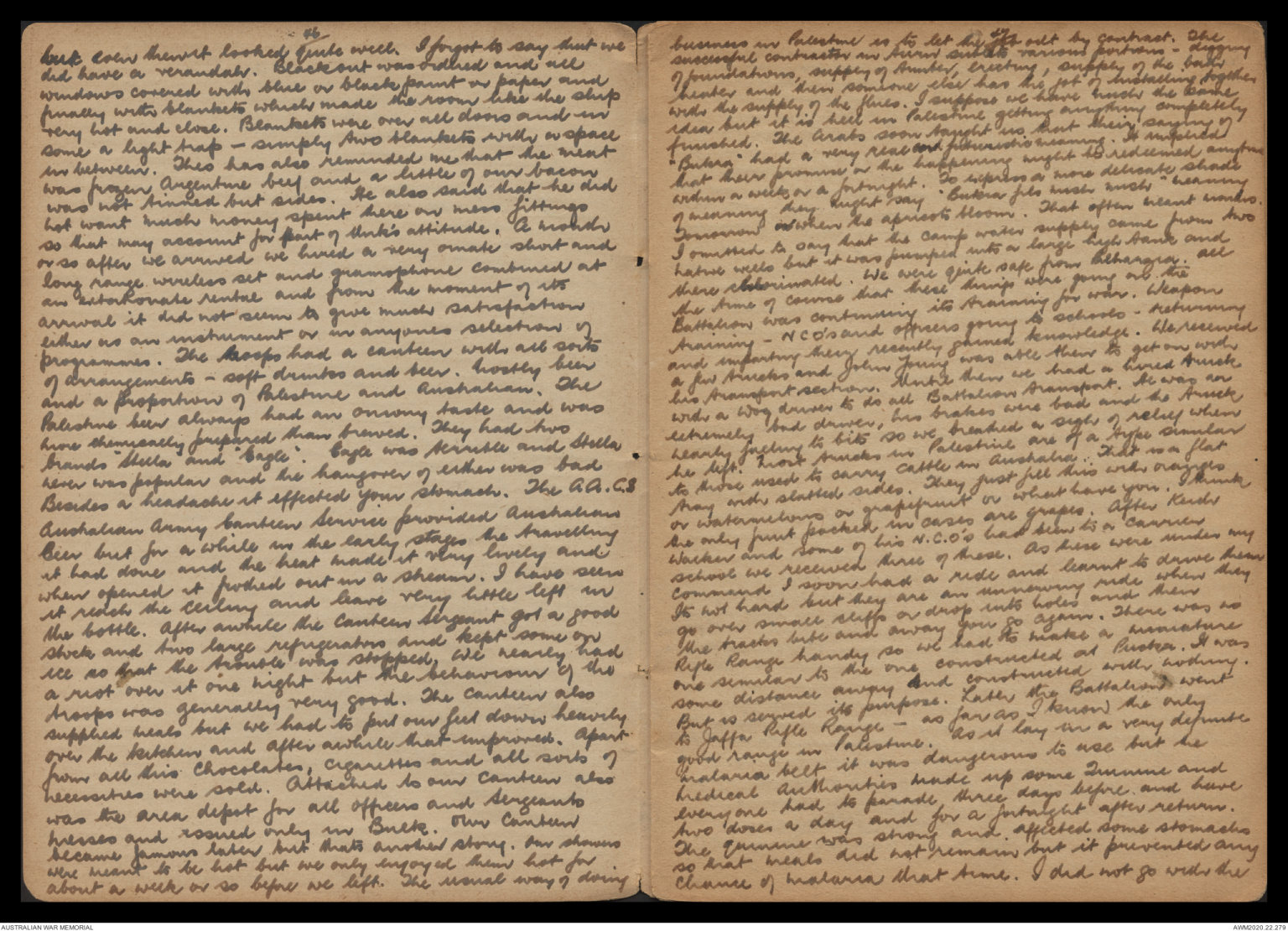
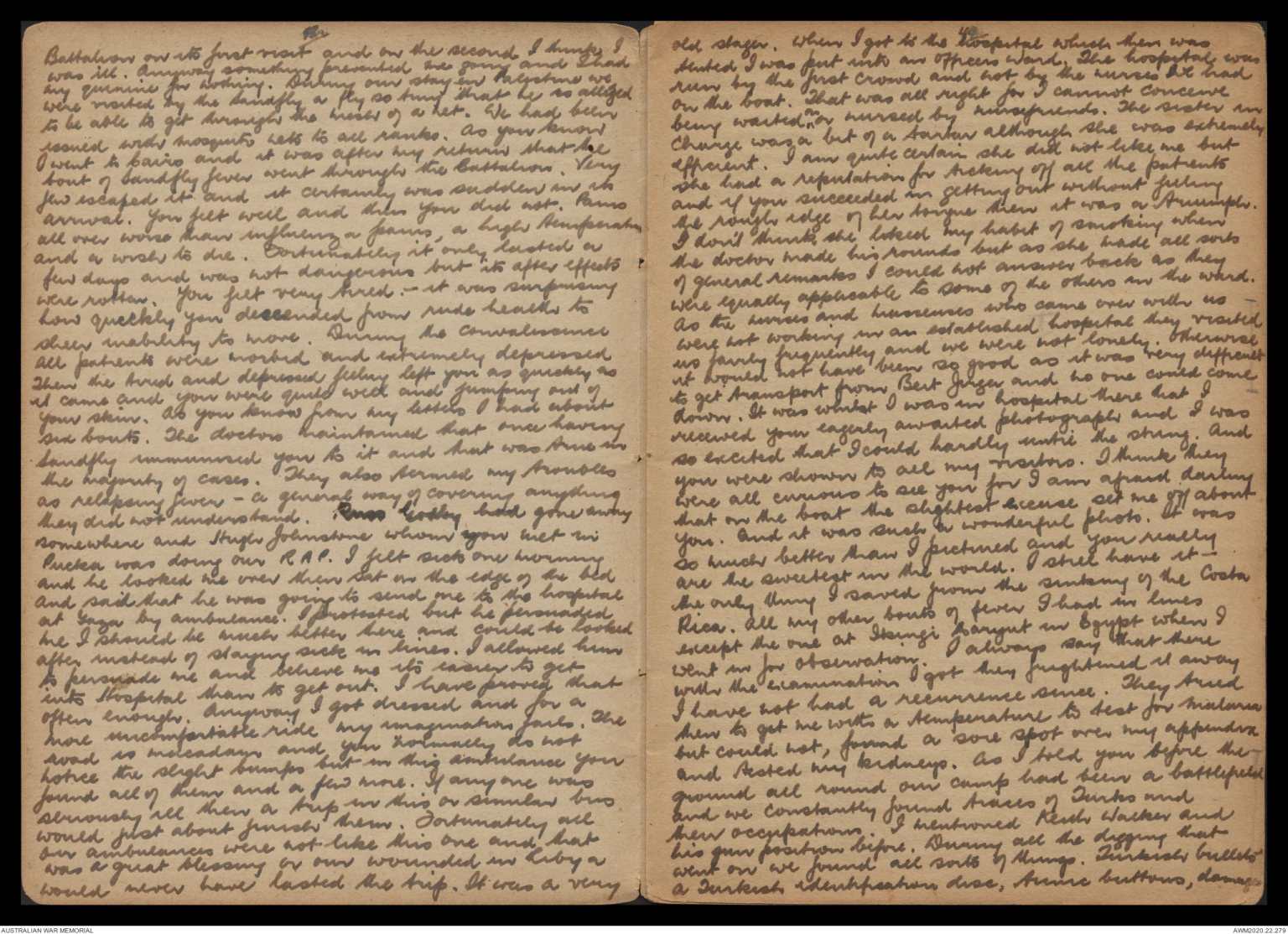
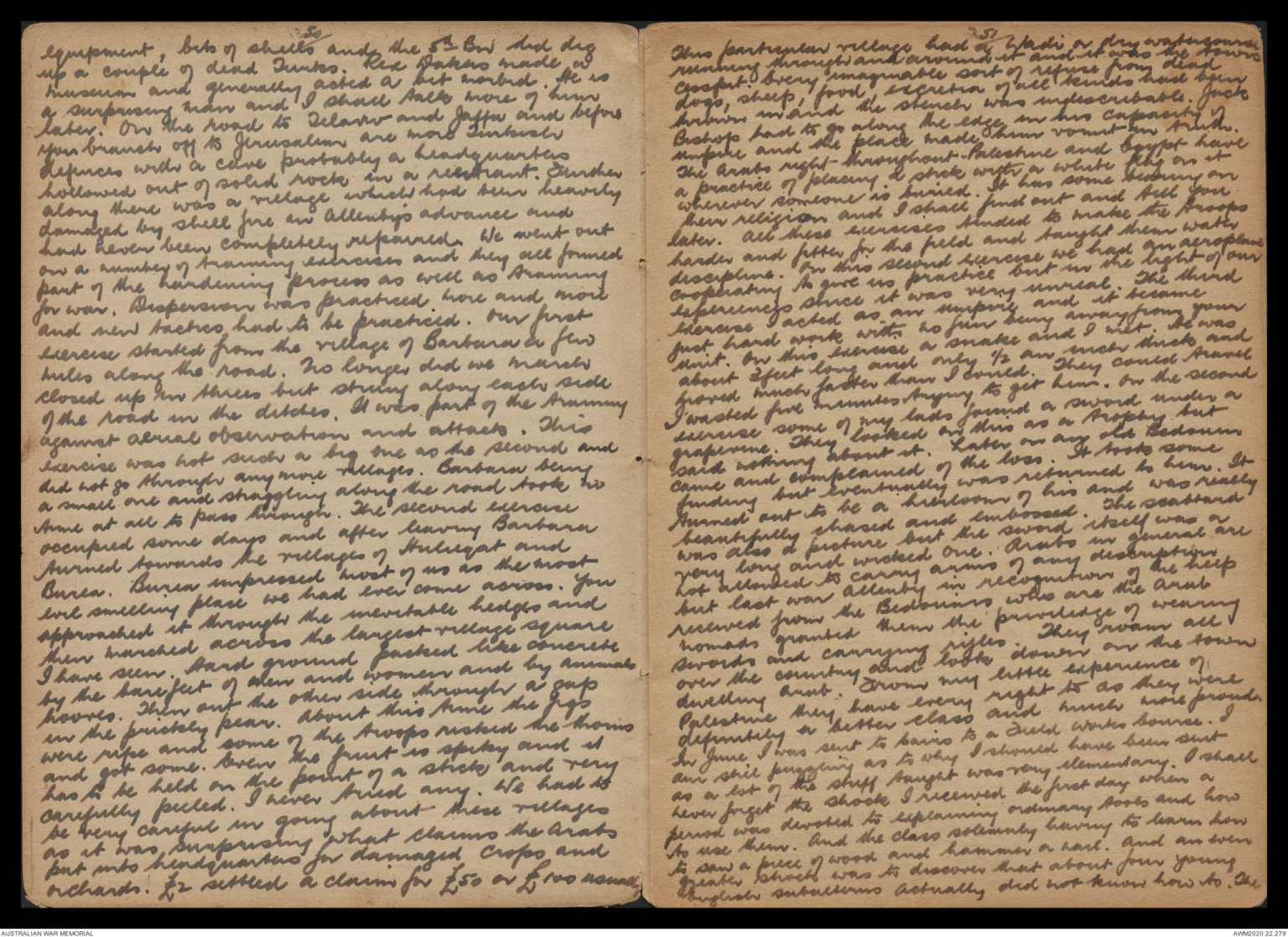
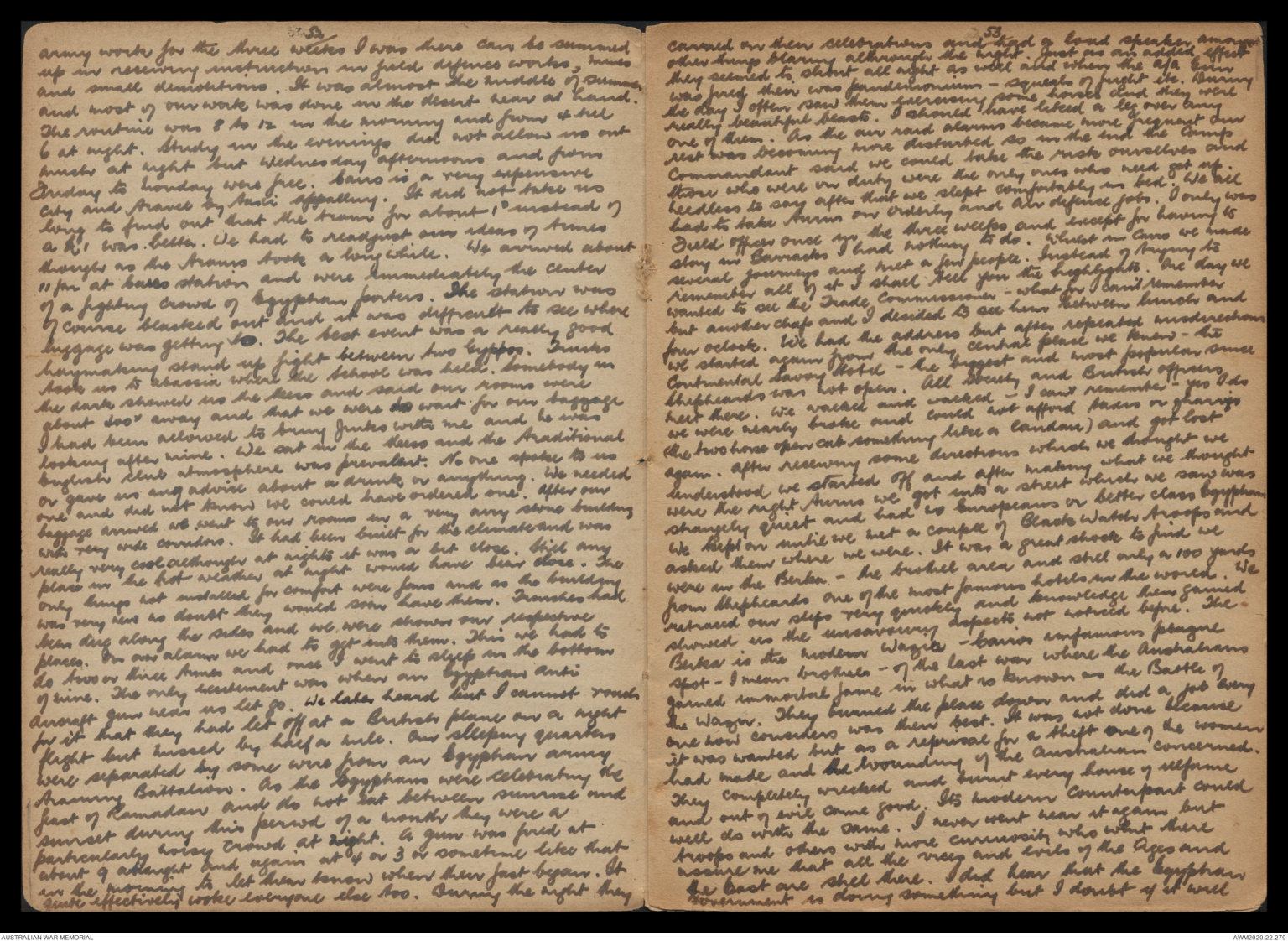
Vx34 MAJOR H. C D. MARSHALL
A.I.F.
3317
11
Nr. 4
37
the idea being to give them cover from splinters from bombs
and bullets whilst they were asleep. At the same time a
perimeter defence was laid out. That is a defence system
all the way round the camp including all the Brigade
area was reconnoitred and then dug. This all took some
time and the men felt that they only come to Palestine
to shift dirt. Apart from the necessity known to the powers
that be it was very good training and soon made the
men very fit after the voyage. As soon as the trench system
was finished we had to man it by day and night and
all ammunition was issued, automatic weapons were placed
on a war footing and magasines and belts for these last
[[feled?]]. It was a job not liked by the troops and they hated
the monotony of sitting in trenches in the hot sun looking
and waiting for something to happen. There was one amusing
instance however. Keith Walker had a machine gun
post on our right - situated amongst some old Turkish
trench systems. I had a look at it one day and there
is no doubt that the Turk last war knew how to site
defensive positions. This particular one came in very
handy for our use. This story is secondhand as at
the time I was in Cairo. He sent in a message to
Battalion that the Wogs were massing on his front. We
were of course not trusting Arabs. Guinns Company was
just leaving on a job and was hurriedly recalled
to stand by whilst all preparations were made for all
events. Finally a message carried from Walker that
everything was under control - it was only a Wog
wedding going on in front of him. Life resumed its
normal course. I shall probably tell you again
and again darling that there is no proper sequence
in my story. As things pop into my mind I shall
write about them. We had many warnings about
the country & its inhabitants and animals and
fruits. Jackals are plentiful and so are dogs.
In Palestine the bite of a Jackal or a dog nearly
always develops into Hydrophobia or Rabies so
that no dog was allowed in the Camp or is stay anywhere
near. As soon as a dog appeared you heaved a rock at
it for the bite of an infected dog and particularly an
38
infected jackal passes on the disease to both dog and
human. The jackals were absolutely full of it and as
they roamed wild and free and fought with the native
village dogs it was 10 to 1 that any dog had the virus
which gradually killed it. There was one tale - how
true I don't know that the Black Watch had lost four
men (before out arrival) caused by a jackal attacking
them whilst asleep and savaging them. Hydrophobia
is not now incurable but it is a particularly long and
painful cure. George Silk, a young official news
photographer who came over on our boat and who had
all sorts of painful accidents was bitten in Palestine
after we left and recovered after a long treatment. He
also broke ribs, arms and had pneumonia during
his visit! By the way our camouflage extended to our
permanent buildings and roads. Every surface had
to be covered with sand and ochre and it got very
difficult with a large tin garage and the accompanying
car park. The macadam roads also did not take
kindly is the job. The jerboas or rats which hopped
around like kangaroos were alright but snakes
and scorpions had to be handled with care. There
were few around our camp site fortunately and
when seen got short shrift from our country bred
troops who used a bayonet or boot to kill them.
In fact we had some difficulty getting specimens
for the medical people as our lads use to smash
their heads to pulp to make sure. There were some
very venomous snakes but we had no casualties
from this source. To get back to our warnings.
Because of the mode of life of the country it was
unsafe to eat any garden produce such as
grapes - oranges - grapefruit - water melons etc
unless they had been washed in a solution of
permanganate of potash. Both Arabs and Jews to a lesser
extent and in fact every Continental country are
very much behind us in ideas of sanitation. Anywhere
grape vines - plants - the road is alright for an
Arab and I sometimes think it was part of their relying
39
never to cover their excreta. You had to be careful where you
lay down particularly in the dark. As I have told you
before the Arab and the Jew would pinch anything so we
closed our camp to them and as the main Road went
alongside we shooed them on. If they got off the
main road they got booted onto it again and sent
on their way in double quick time. Ramsay as the
Intelligence Officer was an absolute terror and with
his large boots — overbearing manner and louder voice
soon put the fear of God into visitors. He made it very
easy for the rest of us — he had an eagle eye for the
flutter of native dress and we used to grin when his
voice was heard roaring around the camp. Apart from
the usual guard we had a system of prowlers at
night. Pairs of men travelled around the camp on
no set beat particularly at night. Another warning
was not to drink water from native wells until it had
been boiled. Dysentery was the answer to eating untreated
fruit and Bilharzia from drinking the water. All these
wells are hundreds of years old and have slime, bodies
no doubt human and definitely animal in them.
I have seen Arab buckets coming up from a village
well — a leather bucket made of a sheep skin and
absolutely green. I am not going to mince matters at
times my dear so that some observations and
remarks will be a bit grim. Bilharzia is a little
worm which gets into the intestines either through
the skin or mouth and the first symptom is passing
blood. It has started eating. It is not incurable
if taken early. One of my lads got it through
bathing in the Jordan River. A week after we arrived
was Empire Day so we decided on a celebration. Alan
Bamford had a portable wireless set which was
a great boon. We had a bottle of gin from the
boat, a bottle of Beenleigh Rum Mick had brought
from Australia and a bottle of whiskey. We all
got into Theos tent and talked and drank the
lot whilst waiting for the Kings speech. If you
remember it was a very moving speech — very
sincere and expressed the Empires determination
when it had finished and the played the National
40
Anthem we all rose and stood solemnly to attention
and really meant it. I think you have seen Theo's
picture of the party taken by the light of two hurricane
lanterns. It was quite a good effort particularly of the
empty Gin and Rum bottles which came out perfectly.
Theo and Mick had the large EPIP tents and Company
Commanders a bell tent to themselves near the mess and
Showers. The subalterns and Coy 2 i/c shared EPIP in
the lines — four to a tent. Marks and I very early had to
make a visit to Tel Aviv to the Bank and draw some
money from the Battalions Letter of Credit. I shall make
further mention of it later. I did not like it. Soon after
we arrived we found a system in force of letting out the
use of the native shops to a contractor. He paid the Army
so much and a percentage of his profits. Before we arrived
we found that Division had let our Bn. area to someone
named Hanna Bishirat. This was usual practice and
he in turn sublet the shops — we had a banker, tailor,
fancy goods including photographic supplies who paid him
an extortionate price for their stand and made a loss.
The troops shaved themselves mostly after trying the
experience of the natives, used hairdressers amongst the
troops and in consequence we had a succession of
new barbers who all paid Bishirat his price and
lost money. The tailor got some and when the
troops found the fancy goods merchant was profiteering
in our endeavour to cover his losses they left him
severely alone. All natives within the camp area had
to have a pass after they had been examined by a
central authority and I think vouched for by the
Palestine Police. We however had the last say and
could kick them out at a moments notice for any
infringement of orders. Ramsay was pretty good
at it and was cordially hated and feared. When
he went sick the Wogs had a holiday. When we
were first discussing the contract Hanna Bishirat
called on Theo. He was the most unmitigated
scoundrel - could speak fair English and was
so smooth and soapy that he defeated his own
purpose with us. He claimed that he was one of T.E
41
Lawrence's trusted assistants in his famous campaign
last war and brought photos of himself and Lawrence to
prove it. He gave us each a selection. Probably he was but
I could never conceive Lawrence trusting him. He was the
greatest rogue and thief I ever imagined but he was very
wealthy and conned money out of his unfortunate
lessees — whether Jew or Arab. He gave us all sorts of
pleasures? — offered his very fine car for our use at
weekends — offered to take us to Jerusalem or Jaffa and
show us the life of the city. Had we gone we would
have been in his power and he could have dictated
the running of the contract away from the printed
clauses. None of us fell into that trap. He was a very
fine looking hawk faced Arab and moved and acted
in the dignified manner of books. But he would have
cut your throat as soon as not and crawled all over
you before doing it. Smarmy. The native hairdresser goes
to no amount of trouble and finesse in shaving or cutting
hair and really gives the impression of being scrupulously
clean but it is only on the surface. The Arab hairdresser
used a razor in haircutting a great deal more than clippers.
And all bowed and scraped in a way calculated to make
me feel ill. In all shops they had officers and a
troops price. Naturally dearer for officers but they usually
turned on coffee to curry favor. After two months we were
able to sack Hanna and had to hold back some of his
property until he paid us profit percentage. It took
quite awhile. We then cut out the main contractor and
formed leases direct with the shopkeepers to the benefit
of all concerned. One of these was the son in law of a
friend of Germans and I shall tell you more about him
in another place. The cleaning of sanitary arrangements
latrines and grease traps was another main contract
to a native who employed more natives to do the job.
They proved a nuisance for awhile but as soon as
we threatened to cancel the contract the big boss came
to heel and saw us and produced a fair result to
our satisfaction. Latrines were duplicated — one for
native who will not use the type of seat we have. They
squat. In any case they were not allowed into ours.
I think I might as well describe the Arab people here. They
are to our thinking the dirtiest people we have met.
They live in almost airless mud huts in villages
the houses close together in very narrow streets and they
42
throw offal, rubbish, decayed food, excretion in fact
anything they have not use for anywhere — on the street
against walls and the places stink to high heaven. Their
ideas of sanitation are elementary and simple — the
nearest wall or flat space is the best. The young Arab boy
before approaching manhood wears a skull cap of black felt
rather like those close fitting knitted caps for women as
fashionable once. I don't know when or how he graduates
into wearing the black braid and flowing headdress.
He wears a shirt and a pair of breeches tight at the
knee and calf and then very full above with a
definite bag at his posterior. All Muslims wear
this type of trouser as it is their belief that the
Prophet when he returns to earth will be reborn or
born of man not woman so they wear these loose
trousers with the definite bag to give him a
chance. They are all spare both and boy and
when grown to manhood mainly tall lean men
with his dark acquiline features and black hair
I have just asked the room most of whom have been
in Palestine whether they have ever seen a fat Arab
None of us can remember any. I have seen a few
swimming naked on the beaches and they have
beautiful figures. The women are all clothed neck
to knee and wear some sort of a headdress a cross
between a handkerchief and gypsy's headdress.
The practice of veiling seemed to be dying out around
our area but if you came to close some of them
drew this headdress across their faces. Mainly the
older women and they really had something to
conceal. The women when young are usually
beautiful but soon lose their looks through
hardwork and childbearing I suppose. I dont
know if I am correct but an Arab woman looks
old after 22 or so. All wear ornaments — bracelets
earrings and necklaces and bright colors but
even if they do not veil they are exceedingly shy
or frightened if any one looks at them and usually
disappear into their houses or into a grove when
we marched through. They don't stop peering at
you from all sorts of cracks and half open doors
but it would be as much as an Arab woman's
43
life to be caught smiling. The Arab guards his women
folk very carefully and accepts no excuses. The little
girls are the most beautiful when they are about six
to ten. They laugh and smile and beg and at that
age do not suffer from custom. They really have
the most delightful smiles and flashing teeth and
beg — how they can beg. From an early age all Arab
females carry water and large loads on their heads
and it is the poetry of motion to see them walking
with or without loads — barefooted of course but their
balance and carriage is perfection. That is until very
old and shapeless but still you can see training of
a lifetime. The transport of Palestine is by donkey and
camels and it is unbelievable the loads that these poor
creatures are sometimes forced to carry. Every one rides
a donkey sitting well back on the rump and carrying
a stick. Their heels drum into the donkeys side every
Yard — not hard but an rythm to the motion of the beast
and I verily believe the donkey would not move unless
he felt these kicks. I can't say I have seen any evidence
of deliberate cruelty to animals except these to our eyes
shocking loads. Probably the size and not the weight
is what sticks in our minds. The donkeys don't seem
to mind and continue on quite contentedly seemingly.
The camel is not so usual in Palestine as in Egypt but
is quite common and used on the roads for carrying.
whilst at Beit Jirja we had half a dozen horses in the
Brigade for the use of the Field Office. I think I told you
in my letters I went out riding with Eric Barlhasche a
couple of times and also on my own. We rode down to
the sea a couple of times and saw Arabs fishing and
swim naked. It was there that I first felt the waters
of the Mediterranean. It is strange that no horse can
stand a camel or the smell of one and our rides were
enlivened in consequence. You had to watch your
horse passing a building. It may have had a camel
in it or stabled there and the smell will induce
him to jump from a walk into a gallop to get away.
Most Arab villages are surrounded by a hedge of
prickly pear which is highly prized in Palestine
as a protection and for its fruit. It is not a pest
and anyone breaking the leaves get a very
rigorous protest if seen. All their orchards and
vineyards are surrounded by this as a hedge
and all lanes and roads usually are lined
with it. I mean small roads and lanes not
44
the main macadam roads. I remember one ride fairly
vividly. We had gone out from camp — a groom and myself
and enjoyed a quiet ride through the vineyards. Some
miles from camp we had to pass an arab village and go
over their communal square which in this case was not within
the village. A caravan of camels was assembled there — about
20 or 30 and our horses could not be forced any nearer than
100 yards of them. It meant angling across and as soon as
the smell left them they were quite tractable. Later on we
were passing a mud hut at the side of a lane when both
horses just jumped into a gallop and went for about 100
yards flat out before we could pull them up. There was
absolutely nothing in sight to frighten the so we could only
conclude that a camel was bedded down in this shed.
We continued on to the shore and had a swim. Coming
back when in a long narrow lane with high prickly
pear hedges we met a camel coming the other way. Then
the trouble started. After about five minutes the orderly
got his horse through the gap of five feet between the
camel and the hedge but he was wearing spurs. As you
know I never have rowels in mine and this was one
time I wanted them. The horse and I fought it out for
nearly ten minutes — he was quite prepared to go but
jibbed at passing the camel. Anyway after I gave him
a really good kick he just bolted past as far from
the camel as he could. I was afraid that he would go
into the hedge but he just missed. In fact I picked a
few spikes out of my breeches. He was determined to put
as great a distance as possible between himself and the
Camel and as I did not mind the gallop we had
nearly a mile flat out when the heat and sand
stopped him. I enjoyed those rides. We of course started
the officers Mess as soon as possible. It was quite a big
building with the entrance facing and just off the main
road. A small ante room with hat hooks. On each side
were two big rooms and straight out the back the kitchen
The building were of cheap European timber - very
cheap pine and unlined with malthoid roofs. The
windows had fly screens but they were not very
efficient. The room on the right was used as a
dining room with a head table for 5 and two
arms down each side. The other room on the left
45
of the ante room was larger and was the bar and living
room. It was furnished with some of the usual tables of
military pattern and few gimcrack folding chairs, Mick
at this time was very funny and did not seem very anxious
to improve it but on a trip to Gaza I bought some grass
mats and when I went to Cairo brought back some travel
posters which made the place look a little more cheerful.
Right throughout our stay in Palestine the food was
terrible. The meat supplied was probably goat but we
preferred to think of it as camel and it was tasteless and
usually uneatable. It may have been sheep but none of
us liked it. We were able to buy local eggs and they were
rather a gamble but the bacon was tinned and terribly
fat. Our mess secretary was not a go getter and I forget
who was acting then but Wackery was given the job. He
produced extras bought from a shop in Gaza but they
only helped a bit. Mick I am afraid was rather inclined
to act as the perfect soldier and take the rough with the
smooth without trying to improve the rations. Theo I know
protested vehemently several times but even constant
changes of cooks did not seem to improve the rations
or provide any variety. As you know we took with us
some of the money made with the canteen in Australia
and together with the small profits received from the
canteen we bought grapefruit from some Jews although
the season was nearly over and they were issued twice
a week to the troops. Palestine grows wonderful citrus
fruits and part of our rations issue from the army was
bottled orange, lemon and grapefruit juice. These
were always welcome and I think we got one each
per week. Later on when grapes and watermelons
ripened we were able to buy these too. Early we
received Sydney turned butter but it was not a success
as most of it was rancid. The usual form of packing
was delivered later and proved good. The mess never
really functioned under Mick and was nothing out
of the ordinary - in fact bad. It is not boasting to say
that when Henry and I ran it it was much better
and worth going into. My tour never started officially
until Egypt but I used to help Harry. Outside the
mess was a blank space to the road but Sol Green
bought some orange and lemon trees and we employed
a few Wogs to dig it up and straighten it out. I am
not sure but I think Mick or someone anyway
got hold of some canna bulbs which we put it.
As we left it was coming on nicely and we all
felt that we would have liked to have seen the cannas
flowering. I have just been talking to Theo who saw at
later but when we left the Arabs got amongst the plants
46
but even then it looked quite well. I forgot to say that we
did have a verandah. Blackout was ordered and all
windows covered with blue or black paint or paper and
finally with blankets which made the room like the ship
very hot and close. Blankets were over all doors and in
some a light trap - simply two blankets with a space
in between. This has also reminded me that he did
was frozen Argentine beef and a little of our bacon
was not tinned but sides. He also said that he did
not want much money spent there on mess fittings
so that may account for part of Mark's attitude. A month
long range wireless set and gramophone combined at
an extortionate rental and from the moment of its
arrival it did not seem to give much satisfaction
either as an instrument or in anyones selection of
programmes. The troops had a canteen with all sorts
of arrangements - soft drinks and beer. Mostly beer
and a proportion of Palestine and Australian. The
Palestine beer always had an oniony taste and was
more chemically prepared than brewed. They had two
brands "Stella" and "Eagle". Eagle was terrible and Stella
never was popular and the hangover of either was bad
Besides a headache it effected your stomach. The A.A.C.S.
Australian Army Canteen Service provided Australian
Beer but for a while in the early stages the travelling
it had done and the heat made it very lively and
when opened it frothed out in a stream. I have seen
it reach the ceiling and leave very little left in
the bottle. After awhile the Canteen Sergeant got a good
stock and two large refrigerators and kept some on
ice so that the trouble was stopped. We nearly had
a riot over it one night but the behaviour of the
troops was generally very good. The Canteen also
supplies meals but we had to put our feet down heavily
over the kitchen and after awhile that improved. Apart
from all this chocolates, cigarettes and all sorts of
necessities were sold. Attached to our Canteen
was the area depot for all officers and Sergeants
messes and issued on in Bulk. Our Canteen
became famous later but thats another story. Our showers
were meant to be hot but we only enjoyed them hot for
about a week or so before we left. The usual way of doing
47
business in Palestine is to let the [[?]] out by contract. The
successful contractor in turn sublets various portions - digging
of foundations, supply of timber, erecting, supply of the bath
heater and then someone else has the job of installing together
with the supply of the flues. I suppose we have much the same
idea but it is hell in Palestine getting anything completely
finished. The Arabs soon taught us that their saying of
"Butera" had a very real and futuristic meaning. It implied
that their promise or the happening might be redeemed anytime
within a week or a fortnight. To express a more delicate shade
of meaning they might say "Butera fils mush mush" meaning
Tomorrow or when the apricots bloom. That often meant months.
I omitted to say that the camp water supply came from two
native wells but it was pumped into a large high tank and
there chlorinated. We were quite safe from bilharzia. All
the time of course that these things were going on the
Battalion was continuing its training for war. Weapon
training - NCO's and officers going to schools - returning
and imparting their recently gained knowledge. We received
a few trucks and John Young was able then to get on with
his transport section. Until then we had a hired truck
with a Wog driver to do all Battalion transport. He was an
extremely bad driver, his brakes were bad and the truck
nearly falling to bits so we breathed a sigh of relief when
he left. Most trucks in Palestine are of a type similar
to those used to carry cattle in Australia. That is a flat
tray and slatted sides. They just fill this with oranges
or watermelons or grapefruit or what have you. I think
the only fruit packed in cases are grapes. After Keith
Wacker and some of his N.C.O's had been to a carrier
school we received three of these. As these were under my
Command I soon had a ride and learnt to drive them
Its not hard but they are an unnerving ride when they
go over small cliffs or drop into holes and then
the tracks bite and away you go again. There was no
Rifle Range handy so we had to make a miniature
one similar to the one constructed at Pucka. It was
some distance away and constructed with nothing.
But it served its purpose. Later the Battalion went
to Jaffa Rifle Range - as far as I know the only
good range in Palestine. As it lay in a very definite
malaria belt it was dangerous to use but the
medical authorities made up some Quinine and
every one had parade three days before and have
two doses a day and for a fortnight after return.
The quinine was strong and affected some stomachs
so that meals did not remain but it prevented any
chance of malaria that time. I did not go with the
48
Battalion on its first visit and on the second I think I
was ill. Anyway something prevented me going and I had
my quinine for nothing. During our stay in Palestine we
were visited by the sandfly a fly so tiny that he is alleged
to be able to get through the mesh of a net. We had been
issued with mosquito nets to all ranks. As you know
I went to Cairo and it was after my return that the
bout of sandfly fever went through the Battalions. Very
few escaped it and it certainly was sudden in its
arrival. You felt well and then you did not. Pains
all over worse than influenza [[feams?]], a high temperature
and a wish to die. Fortunately it only lasted a
few days and was not dangerous but its after effects
were rotten. You felt very tired - it was surprising
how quickly you descended from rude health to
sheer inability to move. During the convalescence
all patients were morbid and extremely depressed
Then the tired and depressed feeling left you as quickly as
it came and you were quite well and jumping out of
your skin. As you know from my letters I had about
six bouts. The doctors maintained that once having
sandfly immunised you to it and that was true in
the majority of cases. They also termed my troubles
as relapsing fever - a general way of covering anything
they did not understand. Russ Godley had gone away
somewhere and Hugh Johnstone whom you met in
Pucka was doing our RAP. I felt sick one morning
and he looked me over then sat on the edge of the bed
and said that he was going to send me to the hospital
at Gaza by ambulance. I protested but he persuaded
me I should be much better there and could be looked
after instead of staying sick in lines. I allowed him
to persuade me and believe me its easier to get
into Hospital than to get out. I have proved that
often enough. Anyway I got dressed and for a
more uncomfortable ride my imaginations fails. The
road is macadam and you normally do not
notice the slight bumps but in this ambulance you
found all of them and a few more. If any one was
seriously ill then a trip in this or similar bus
would just about finish them. Fortunately all
our ambulances were not like this one and that
was a great blessing or our wounded in Libya
would never have lasted the trip It was a very
49
old stager. When I got to the hospital which then was
tented I was put into an officers ward. The hospital was
run by the first crowd and not by the nurses we had
on the boat. That was all right for I cannot conceive
being waited ∧on or nursed by nurse friends. The sister in
charge was a bit of a tartar although she was extremely
efficient. I am quite certain she did not like me but
she had a reputation for ticking off all the patients
and if you succeeded in getting out without feeling
the rough edge of her tongue then it was a triumph.
I don't think she liked my habit of smoking when
the doctor made his rounds but as she made all sorts
of general remarks I could not answer back as they
were equally applicable to some of the others in the ward.
As the nurses and [[?]] who came over with us
were not working in an established hospital they visited
us fairly frequently and we were not lonely. Otherwise
it would not have been so good as it was very difficult
to get transport from Bert Jirger and could come
down. It was whilst I was in hospital there that I
received your eagerly awaited photograph and I was
so excited that I could hardly untie the string and
you were shown to all visitors. I think they
were all curious to see you for I am afraid darling
that on the boat the slightest excuse set me off about
you. And it was such a wonderful photo. It was
so much better than I pictured and you really
are the sweetest in the world. I still have it -
the only thing I saved from the sinking of the Costa
Rica. All my other bouts of fever I had in lines
except the one at Ikingi Maryut in Egypt when I
went in for observation. I always say that there
with the examination I got they frightened it away
I have not had a recurrence since. They tried
then to get me with a temperature to test for malaria
but could not, found a sore spot over my appendix
and tested my kidneys. As I told you before the
ground all round our camp had been a battlefield
and we constantly found traces of Turks and
their occupations. I mentioned Keith Wacker and
his gun position before. During all the digging that
went on we found all sorts of Mungs. Turkish bullets
a Turkish identification disc, tunic buttons, damaged
50
equipment, bits of shells and the 5th Bn did dig
up a couple of dead Turks. Rex Dakers made a
museum and generally acted a bit morbid. He is
a surprising man and I shall talk more of him
later. On the road to Telaviv and Jaffa and before
you branch off to Jerusalem are more Turkish
defences with a cave probably a headquarters
hollowed out of solid rock in a reentrant. Further
along there was a village which had been heavily
damaged by shell fire on Allenby's advance and
had never been completely repaired. We went out
on a number of training exercise and they all formed
part of the hardening process as well as training
for war. Dispersion was practiced more and more
and new tactics had to be practiced. Our first
exercise started from the village of Barbara a few
miles along the road. No longer did we march
closed up in threes but strung along each side
of the road in the ditches. It was part of the training
against aerial observation and attacks. This
exercise was not such a big one as the second and
did not go through any more villages. Barbara being
a small one and struggling along the road took no
time at all to pass through. The second exercise
occupied some days and after leaving Barbara
turned towards the villages of Huluqat and
Burea. Burea impressed most of us as the most
evil smelling place we had ever come across. You
approached it through the inevitable hedges and
then marched across the largest village square
I have seen. Hard ground packed like concrete
by the bare feet of men and women and by animals
hooves. Then out the other side through a gap
in the prickly pear. About this time the figs
were ripe and some of the troops risked the thorns
and got some. Even the fruit is spikey and it
has to be held on the point of a stick and very
carefully peeled. I never tried any. We had to
be very careful in going about these villages
as it was surprising what claims the Arabs
put into headquarters for damaged crops and
orchards. £2 settled a claim for £50 or £100 monthly
51
This particular village had a Wadi or dry watercourse
running through and around it and it was the towns
cesspit. Every imaginable sort of refuse from dead
dogs, sheep, food, excretia of all kinds had been
thrown in and the stench was indescribable. Jack
Bishop had to go along the edge in his capacity of
umpire and the place made him vomit in truth.
The Arabs right throughout Palestine and Egypt have
a practice of placing a stick with a white flag on it
wherever someone is buried. It has some meaning in
their religion and I shall find out and tell you
later. All these exercises tended to make the troops
harder and fitter for the field and taught them water
discipline. On this second exercise we had an aeroplane
cooperating to give us practice but in the light of our
experiences since it was very unreal. The third
exercise acted as an umpire and it became
just hard work with no fun being away from your
unit. On this exercise a snake and I met. He was
about 3 feet long and only ½ an inch thick and
moved much faster than I could. They could travel
I wasted five minutes trying to get him. On the second
exercise some of my lads found a sword under a
grapevine. They looked on this a trophy but
said nothing about it. Later on an old Bedouin
came and complained of the loss. It took some
finding but eventually was returned to him. It
turned out to be a hierloom of his and was really
beautifully chased and embossed. The scabbard
was also a picture but the sword itself was a
very long and wicked one. Arabs in general are
not allowed to carry arms of any description
but last war Allenby in recognition of the help
received from the Bedouins who are the Arab
nomads granted them the privilege of wearing
swords and carrying rifles. They roam all
over the country and look down on the town
dwelling Arab. From my little experience of
Palestine they have every right to as they were
definitely a better class and much more proud.
In June I was sent to Cairo to a field works course. I
am still puzzling as to why I should have been sent
as a lot of the stuff taught was very elementary. I shall
never forget the shock I received the first day when a
period was devoted to explaining ordinary tools and how
to use them. And the class solemnly having to learn how
to saw a piece of wood and hammer a nail. And an even
greater shock was to discover that about four young
English subalterns actually did not know how to. The
52
army work for the three weeks I was there can be summed
up in receiving instruction in field defence works, mines
and small demolitions. It was almost the middle of summer
and most of our work was done in the desert near at hand.
The routine was 8 to 12 in the morning and 4 till
6 at night. Study in the evening did not allow us out
much at night but Wednesday afternoons and from
Friday to Monday were free. Cairo is a very expensive
city and travel by taxi appalling. It did not take us
long to find out that the train for about 1d instead of
a £1 was better. We had to readjust our ideas of times
though as the trains took a long while. We arrived about
11 pm at Cairo station and immediately the center
of a fighting crowd of Egyptian porters. The station was
of course blacked out and it was difficult to see where
luggage was getting to. The best event was a really good
haymaking stand up fight between two Egyptos. Trucks
took us to abassia where the School was held. Somebody in
the dark showed us the mess and said our rooms were
about 1ooy away and that we were to wait for our luggage
I had been allowed to bring Jenks with me and he was
looking after mine. We sat in the mess and the traditional
English club atmosphere was prevalent. No one spoke to us
or gave us any advice about a drink or anything. We needed
one and did not know we could have ordered one. After our
baggage arrived we went to our rooms in a very army stone building
with very wide corridors. It had been built for the climate and was
really very cool although at nights it was a bit close. Still any
place in the hot weather at night would have been close. The
only things not installed for comfort were fans and as the building
was very new no doubt they would soon have them. Trenches had
been dug along the sides and we were shown our respective
places. On our alarm we had to get into them. This we had to
do two or three times and once I went to sleep in the bottom
of mine. The only excitement was when an Egyptian anti
aircraft gun near us let go. We later heard but I cannot vouch
for it that they had let off at a British plane on a night
flight but missed by half a mile. Our sleeping quarters
were separated by some wire from an Egyptian army
[[Arameny?]] Battalion. As the Egyptians were celebrating the
feast of Ramadan and do not eat between sunrise and
sunset during this period of a month they were a
particularly noisy crowd at night. A gun was fired at
about 9 at night and again at 4 or 3 or sometime like that
in the morning to let them know when their fast began. It
quite effectively woke everyone else too. During the night they
53
carried on their celebrations and had a loud speaker amongst
other things blaring althrough the night. Just as an added effect
they seemed to shout all night as well and when the a/a Gun
was fired then was pandemonium - squeals of fright etc. During
the day I often saw them exercising some horses and they were
really beautiful beasts. I should have liked a leg over any
one of them. As the air raid alarms became more frequent our
rest was becoming more disturbed so in the end the camp
Commandant said we could take the risk ourselves and
those who were on duty were the only ones who need get up.
Needless to say after that we slept comfortably in bed. We all
had to take turns on orderly and air defence jobs. I only was
Field Officer once in the three weeks and except for having to
stay on Barracks I had nothing to do. Whilst in Cairo we made
several journeys and met a few people. Instead of trying to
remember all of it I shall tell you the highlights. One day we
wanted to see the Trade Commissioner - what for I can't remember
but another chap and I decided to see him between lunch and
four oclock. We had the address but after repeated misadventures
we started again from the only central place we knew - at
Continental Savoy Hotel - the biggest and most popular since
Shepheards was not open. All society and British officers
went there. We walked and walked - I can't remember - yes I do
we were nearly broke and could not afford taxis or gharries
(the two horse open cart something like a landau) and got lost
again. After receiving some directions which we thought we
understood we started off and after making what we thought
were the right turns we got into a street which we saw was
strangely quiet and had as Europeans or better class Egyptians
We kept on until we met a couple of Black Watch troops and
asked them where we were. It was a great shock to find we
were in the Berka - the brothel area and still only a 100 yards
from Shepheards one of the most famous hotels in the world. We
retraced our steps very quickly and knowledge then gained
showed us the unsavoury aspects not noticed before. The
Berka as the modern Wazile - Cairos infamous plague
spot - I mean brothels - of the last war where the Australians
gained immortal fame in what is known as the Battle of
the Wazir. They burned the place down and did a job every
one now considers was then best. It was not done because
it was wanted but as a reprisal for a theft one of the women
had made and the wounding of the Australian concerned.
They completely wrecked and burnt every house of illfame
and out of evil came good. Its modern counterpart could
well do with the same. I never went near it again but
troops and others with more curiosity who went there
assure me that all the vices and evils of the Ages and
the last are still there. I did hear that the Egyptian
government is doing something but I doubt if it will
 Sam scott
Sam scottThis transcription item is now locked to you for editing. To release the lock either Save your changes or Cancel.
This lock will be automatically released after 60 minutes of inactivity.